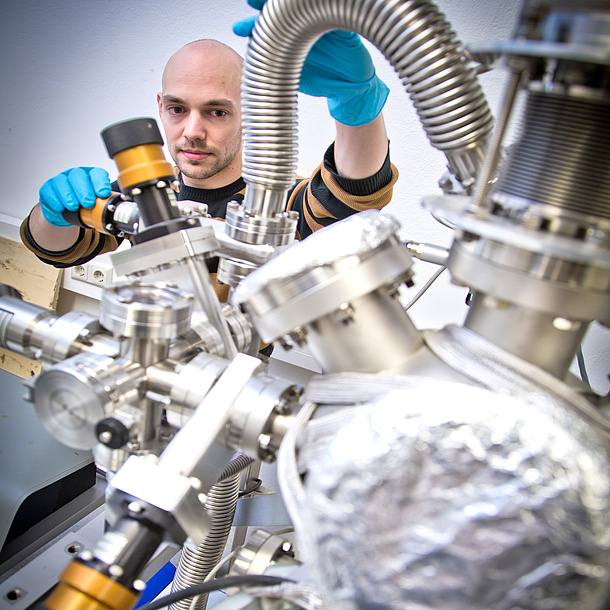- Duration of study: 4 semesters
- ECTS credit points: 120
- Academic degree: Master of Science (MSc)
- Language of instruction: English
The Master's Programme
During your studies, you will receive a demanding, comprehensive physical-mathematical education. The broad basic training includes the following compulsory modules:
- Statistical Physics: You will acquire knowledge about statistical physics and quantum statistics.
- Advanced Quantum Mechanics: You will learn the principles of advanced quantum mechanics, such as the many-body theory, scattering theory and the interaction between radiation and matter.
- Introduction to General Relativity and Cosmology: You will receive an introduction to fundamental physical and mathematical concepts of general relativity. You will explore the current cosmological observations in more detail.
You then have the opportunity to specialise in one of five specialised subject areas: Astrophysics, Atmospheric Physics and Climate, Experimental Physics, Space Physics and Aeronomy, or Theoretical and Computational Physics.
By carrying out many practical exercises, you will learn more about current research topics, for example, in the field of “Nano- and Quantum Materials” or “Change Monitoring of System Earth” and gain a deeper understanding of these topics. You will have access to high-quality equipment and laboratory facilities at the TU Graz and University of Graz Physics institutes, enabling you to carry out laboratory exercises and undertake your master’s thesis work.

The master’s programme in Physics provides you with solid basic training and offers you many opportunities to deepen your knowledge in areas ranging from astrophysics and climate physics to nanophysics and elementary particle physics. Through this programme, you contribute to the fundamental human knowledge about the world.
The broad basic education offered forms the foundation for further specialisation in specific subject areas. You can specialise in one of the following five areas:
Astrophysics: You will learn more about the physics of stars, the solar system and even exoplanets.
Atmospheric Physics and Climate: In this subject area, you will focus on the Earth's climate system and how to measure and model atmospheric dynamics.
Experimental Physics: You will explore applications ranging from nanooptics and biophysics to novel quantum materials and atomic processes on surfaces more deeply.
Space Physics and Aeronomy: You will learn about the physics of extra-terrestrial atmospheres and magnetospheres and their experimental observation.
Theoretical and Computational Physics: In this subject area, you learn more about the theoretical description and computer simulation of elementary particles and nanomaterials.
It is also possible to develop individual, in-depth modules with the guidance of a mentor.
International exchange on a scientific level, e.g. in the context of the physics colloquium, is assigned great importance in the master's program.
In addition, internationally renowned visiting professors are invited to spend several weeks at the physics institutes at the University of Graz or TU Graz and provide insights into their research areas.
Students benefit from established cooperation networks with international research institutions such as CERN, international universities, or local institutes such as the Wegener Center for Climate and Global Change or the Graz Space Research Institute.
Long-term partnerships with renowned academic institutions both in Austria and abroad enable you to apply your ideas in practice and carry out master's thesis work.
Networking of physics graduates and students worldwide is supported by the IAPS - International Association of Physics Students. Within the framework of IAPS, conferences, excursions to research institutions (e.g. CERN, Joint European Torus, Gran Sasso National Laboratory), summer schools or exchange programs are organised.
Admission
The prerequisite for admission is a completed bachelor’s degree in a relevant subject (see curriculum).
Additionally, you need to provide evidence of competence in the English language.
Graduates of the Bachelor's Programme Physics at TU Graz or University of Graz are eligible for admission without any further requirements.
Graduates of other bachelor’s degree programmes can contact study@tugraz.at to find out more and apply for admission.
- Admission and deadlines for international students
- Admission and deadlines for Austrian students who are registering to study at TU Graz for the first time
If you have already been admitted to a degree programme at TU Graz, or have studied at TU Graz before, please come to the Registrar's Office in person to complete your admission during the admission period.
Contact study@tugraz.at
Career Prospects
Physicists work as highly qualified specialists in scientific, economic and industrial fields.
Graduates are highly qualified to work in a wide range of interdisciplinary professional fields both in Austria and abroad:
- You work in public and private research and educational institutions in physical-technical fields.
- You participate in large, international research collaborations.
- You work in modelling and simulation in scientific, technical and economic fields.
- You develop algorithms in a wide range of different fields.
- You work in and lead research and development departments in various industrial sectors, and especially in high-tech industry.
- You hold management positions in administration and logistics.
Acquire AI skills: AIE Extension Programme
Increase your career prospects with the Artificial Intelligence Engineering (AIE) extension programme and learn essential skills in AI development and application during or after completing your Master's degree.





